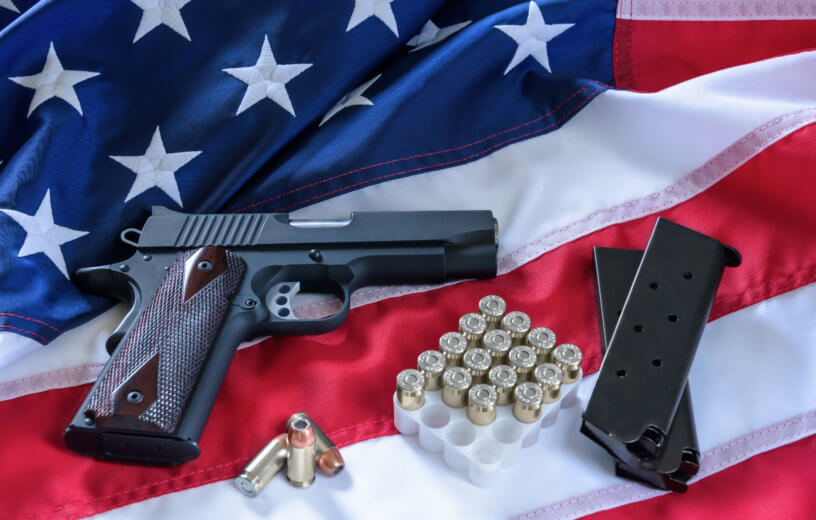MADISON, Wis. — Firearms have been a part of American culture since the days of the founding fathers. Now, a team from the University of Wisconsin-Madison has found a potential connection between modern U.S. gun ownership rates and slavery practices during the Civil War. Study authors say U.S. counties with more slaves in 1860 display a link with modern day residents owning more guns in the 21st century.
There’s no denying the United States has a unique relationship, both culturally and historically, with firearms. Over 45 percent of the planet’s civilian-owned firearms reside in the United States, despite only five percent of the human population living there.
“Gun culture is one case where American Exceptionalism really is true,” says Nick Buttrick, a University of Wisconsin–Madison professor of psychology, in a university release. “We are really radically different even from countries like Canada or Australia, places that have similar cultural roots.”
According to the Pew Research Center, just about two-thirds of gun owning Americans say it’s a means of keeping themselves or their families safe. Citizens of other countries, meanwhile, are much more likely to believe that simply having a gun in one’s home makes the entire house more dangerous. Prof. Buttrick adds that firearms scholars have also been exploring the role of race in American gun attitudes for quite some time. He believes these two factors may indeed by connected.
Gun attitudes changed after the war
Put together in collaboration with study co-author Jessica Mazen, a psychology graduate student at the University of Virginia, this latest report documents a notable shift in American sentiment away from the predominant, pre-Civil War idea of guns serving primarily as tools for hunting and sport. After the Civil War, the notion that a gun was necessary to protect family, property, and the owner’s “way of life” grew in a major way among white southerners.
Researchers say this trend intensified due to a few local and societal factors, including an influx of military weapons, the emergence of armed, white-supremacist organizations like the Ku Klux Klan, and popular rhetoric among wealthy southerners that Reconstruction governments would not protect the interests of white southerners from newly freed and politically-empowered African-Americans.
Study authors compared county-level population data from the 1860 census to gun ownership patterns in the present to reach these findings. Since there is no national record of gun ownership, researchers had to use a proxy; the proportion of suicides in a county that involved a firearm — per CDC mortality records between 1999 and 2016.
“What we see is a strong correlation between the number of slaves in a county in 1860 and the number of guns there now, even after we control for variables like personal politics, crime rates, and education and income,” Prof. Buttrick comments.
Do southerners pass their gun beliefs on to their friends?
The correlation remained robust even when the research team focused solely on white gun owners, by only looking for gun ownership to firearm suicides involving non-Hispanic white victims. All in all, the research indicates the American belief that “guns keep people safe” likely originated in the U.S. south.
“The extent to which people feel unsafe only predicts gun ownership in counties in the South, where the more unsafe people feel, the more likely they are to own a gun,” Prof. Buttrick explains. “If you look in areas that didn’t have any slaves in the 1860s, whether people feel unsafe there today does not predict today’s county-level gun ownership.”
Interestingly, even northern or western U.S. regions with more guns today are home to residents who researchers consider more likely to have Facebook friends living in parts of the South with higher historical rates of slavery. In those northern and western areas, just like in the South, feeling unsafe is more likely to predict increased gun ownership. Study authors attribute this finding to a “social transmission of beliefs about guns.”
“The question is, how do these ideas about guns get to the rest of the country?” Prof. Buttrick ponders. “As people move, they bring with them the culture that formed them. We can see the remnants of those moves and the lingering connections to family and community in people’s social media connections, and it lines up with the slavery-gun-ownership pattern.”
In conclusion, study authors say this work may help provide a clearer idea of how U.S. gun culture has formed and evolved across various areas of the nation. For example, why do some parts of the country still retain a hunting culture in reference to guns, while others almost entirely focus on protection?
“It helps to elucidate some things — why is it that race and guns are so tightly tied together? Why is it that guns are so present in the public mind and discussion for white people and not for Black people?” Prof. Buttrick concludes. “And it does help make sense of why protective gun ownership is such a popular idea in the United States, but not elsewhere.”
The study is published in PNAS Nexus.


Gun control only affects only those least likely to commit violent crimes to begin with. Look first at who is committing violent crime to start with, the target the laws at them, not the lawful citizens.